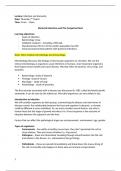Lecture notes
Lecture notes BI505 Infection And Immunity (BIOS5050) on Bacterial Infections and The Comprised Host
- Institution
- The University Of Kent (UKC)
Unlock your academic potential with my notes on Immunity and Infection, tailored specifically for students pursuing Biomedical Science, Biochemistry, Immunology, Biology, Biomedical Engineering and Nursing. These notes are perfect for anyone looking to excel in their studies and gain a deep underst...
[Show more]



